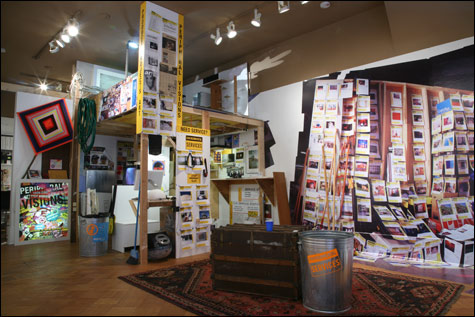
HIGH-CONCEPT: Weathersby asks us to contemplate the beauty in seemingly mundane junk. |
“Douglas Weathersby: The ES Inaugural Retrospective and Storage Loft” | Judi Rotenberg Gallery, 130 Newbury St, BOSTON | Through February 1 “Andrew Witkin: Others Among Others” | LaMontagne Gallery, 555 East Second St, South Boston | Through February 14 |
Over the summer, José Luis Blondet, curator at the Boston Center for the Arts, invited Boston artist Andrew Witkin to do an unspecified project in a hidden corridor at the BCA's Mills Gallery. The hall is a narrow, staff-only space behind one of the gallery walls. Staff used it to store ladders and supplies. The rest of the gallery was booked up, but Blondet thought the odd space might suit Witkin's practice of thoughtfully arranging furniture, rocks, papers, and other stuff.Witkin enlisted the help of Douglas Weathersby, a local conceptual artist whose business, Environmental Services, doubles as a cleaning and an artmaking service. Weathersby, who won the ICA's Foster Prize for hot local artist in 2003, is best known for "shadow drawings," in which he sweeps dirt in a room into the shape of shadows of furniture placed there.
With input from Witkin and help from BCA interns, Weathersby cleaned out the Mills Gallery corridor, pried off panels that were blocking out windows, and built shelves. He painted the whole space matte white, except for the ceiling, which he painted a glossy white, so that light from the newly revealed windows would bounce off the ceiling and into the gallery over the gallery wall, which doesn't quite reach the ceiling. That light is the only public evidence of the piece, since the room itself is still closed to the public. "It's very subtle," Blondet acknowledges.
Witkin and Weathersby both have solo shows in town this month, so I've been thinking again about this collaboration — closed, cerebral, on the border between art and This Old House — and the prominence of conceptual art in Boston.
Conceptual art's local stature comes in part from being the choice of the majority of the ICA's Foster Prize selections over the past five years. That includes the work by three of the four 2008 finalists: Witkin's stylishly ascetic apartment, Joe Zane's droll riffs on artistic identity, and Catherine D'Ignazio's homeland-insecurity video installation.
Local conceptual artists are an amorphous, hard-to-categorize gang. What unites them is a wonkish way of thinking that's easier to sense than to define. Their ideas often manifest themselves through rigorous craftsmanship: Andrew Mowbray's Jules-Verne-by-way-of-Matthew-Barney contraptions, Jane Marsching's recent kite and flags, John Osorio-Buck's survivalist shacks, Deb Todd Wheeler's people-powered contraptions with their bicycle pedals and hand cranks, Jeff Warmouth's screwball puppet films and mock museum displays. Performance is often involved, and often as video: the Institute for Infinitely Small Things' literal enactments of corporate slogans, Platform2's Failure Support Group (a one-night group discussion on failure), Ben Sloat's public restaging of Michael Jackson's dance from Thriller.
Several artists adopt poses of scientific inquiry and expedition. Many use aliases (Warmouth as Jeffu, Mowbray as Tsunami Jones), often reinventing themselves as some sort of "official" enterprise — the Institute, the National Bitter Melon Council, Weathersby's Environmental Services. The tone is mostly serious, dry, not juicy. It all falls in line with Boston's Puritanical streak, Yankee devotion to craftsmanship, and the intellectualism and institutionalism of area colleges. Maybe that's just a coincidence.
Weathersby's "ES Inaugural Retrospective and Storage Loft" at Rotenberg Gallery is an office/clubhouse/loft built in the gallery, with a computer desk, business cards, photos of past "shadow drawings," home-improvementy videos (including work at the home he's moving into in Medford), a jam jar filled with dirty water (purported to be from washing the kitchen in gallerist Barbara Krakow's home), a hose, coiled phone wire, and a giant yarn God's eye. Climb up the stairs into the loft and you find a manual typewriter, an empty aquarium, piles of drawings and typed-on paper, a lamp, an oscillating fan, and a video of an aquarium with a chandelier reflecting in the glass. Life-size photos of Weathersby's home office cover two gallery walls. Environmental Services invoices are stuck on everything in the photos — each with an image and description of a job (cleaning, art moving, installation).
A third wall features photos of ceiling lamps (emphasis on the glow they cast) and various places he's worked (puddles in warehouse-like rooms, a demolished kitchen filled with debris). They seem to be an argument for meditative attention to the beauty in seemingly mundane junk.
Weathersby's project is sometimes described as an investigation of class (blue-collar labor versus art), patronage, and close observation. But the objects here feel like a random survey of his art and his cleaning business. They don't coalesce. A tour guide can help decipher some coded meaning — but even then it feels as if Weathersby were talking to himself, not us.